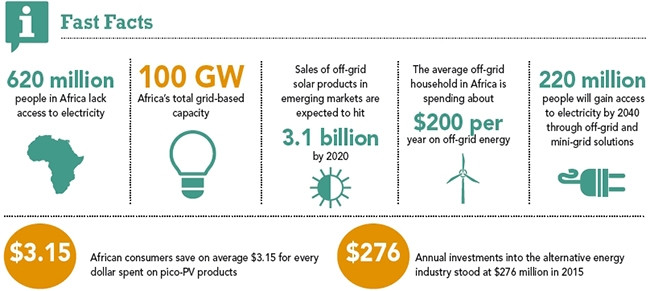
Africa has an electricity problem, and grids are failing to solve it. The African Development Bank (AfDB) says 620 million people on the continent lack access to electricity, with the whole continent having less than 100 GW installed grid-based capacity. Much of that, notably in South Africa, is creaking.
"The utility companies agree that 100 percent universal grid penetration is not possible or feasible, and there is an increasing and tightening embrace of off-grid power technologies," says Jackson Machuhi, MD of Barefoot Power, a provider of solar lighting and phone charging products.
Solar solutions are at the heart of this. The industry in Africa has grown from nothing over the past few years, says Koen Peters, executive director of the Global Off-Grid Lighting Association (GOGLA), as the serious cost benefits become clear.
Off-grid solar is expected to increase further. A recent report released by the World Bank Group and Bloomberg New Energy Finance (BNEF), in collaboration with GOGLA, predicted sales of off-grid solar products in emerging markets will hit $3.1 billion in the next five years.
Jesse Moore is CEO of Kenyan solar provider M-KOPA Solar, which has connected 330 000 households to solar energy in East Africa. He says off-grid solar is turning the entire narrative on energy and development on its head.
"Lack of power has led to staggering losses in terms of economic potential, not to mention adverse health effects. Our offering has enabled low-income earners to access clean energy at a genuinely affordable price point," says Moore.
Fulfilling potential
Notable obstacles need to be overcome if companies like MKOPA are to truly fulfil their potential. Scale is crucial, with most solar providers hindered by the high costs of marketing and distribution.
"One of the challenges we've encountered is the reality of selling in remote areas, where most of our customers are based," Moore adds.
Reaching such a scale requires funding, which is growing, but not yet at the required level. Though M-KOPA has raised sizeable investment rounds, companies at earlier stages of operation are missing out.
"It's important to note here that this sector is not a fully commercial market yet," GOGLA's Peters says.
Grant and impact funding have played a role in the development of the sector, adds Lars Kr"uckeberg, co-founder and CTO of Berlin-based SOLARKIOSK, which operates in Ethiopia, Kenya, Rwanda, Tanzania, Botswana and Ghana.
"The problem is that most of these funding possibilities only support companies that are beyond their startup status. And many good ideas just never reach this point without funding in earlier stages."
However, this is changing. Annual investments in the solar industry rose to $276 million in 2015, with Moore saying there were signs of an increasing interest from commercial investors.
Sustainability
Commercial investors are attracted as business models develop that make reaching poorer, rural populations easier and more profitable. Pay-as-you-go, pioneered by the likes of M-KOPA and PEG Ghana, has been key to this, meaning low-income families are not faced with an unaffordable initial outlay when adopting solar.
Building business models that focus on more than simply poverty alleviation is also key, says Barefoot Power's Machuhi.
"The first notion that needs disproving is that off-grid and poverty are mutually exclusive. Too many scale-up initiatives take a poverty alleviation theme, which quickly stifles the market-led organic growth of supporting ecosystem," he says.
M-KOPA is taking a leaf from this book, allowing customers to purchase more than simply solar power, and thus creating new revenue streams in the long run.
"In January, we launched our upgrades business, which involves us offering a range of practical products to customers who complete their payments on time. To date, we've sold over 50 000 units, including solar TVs, smartphones, water tanks and energy efficient cooking stoves," Moore says.
Solar providers are tackling large societal issues, and as such, players in the sector expect assistance from government. Peters feels African governments must play a part in fostering an enabling environment.
"We need to make sure off-grid has a good spot in national energy access policies, ensuring import duties and tax are removed or 'frozen' to create a more level playing field in relation to other lighting and power technologies that are less clean or sustainable," he says.
Kenya and Tanzania have exempted solar projects from VAT, while Rwanda is motivating for a government-guaranteed rural off-grid solar lighting programme.
"Luckily, most governments now acknowledge the importance of small-scale, low-carbon technologies in bringing energy to off-grid homes," Moore concludes.
This article was first published in the June 2016 edition of ITWeb Brainstorm magazine. To read more, go to the Brainstorm website.
Share